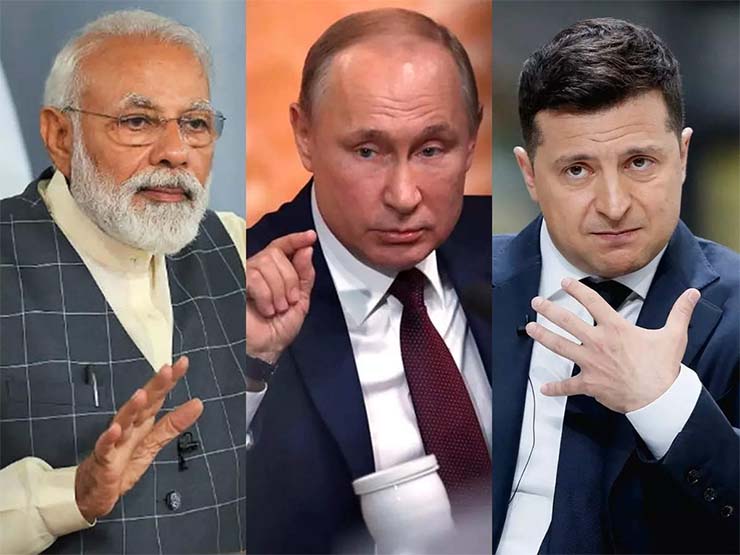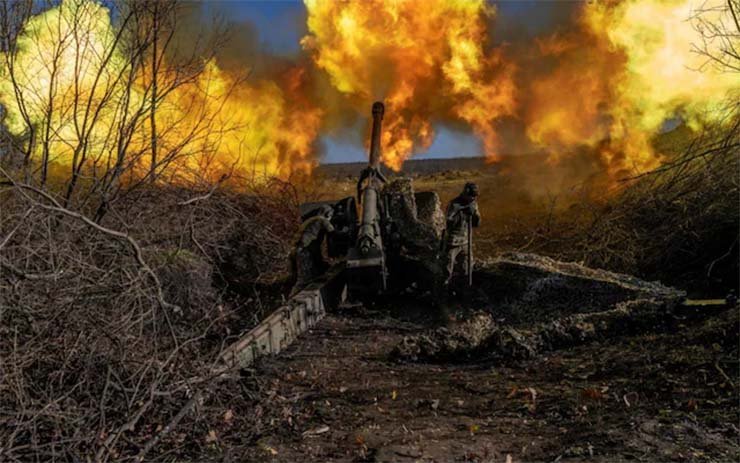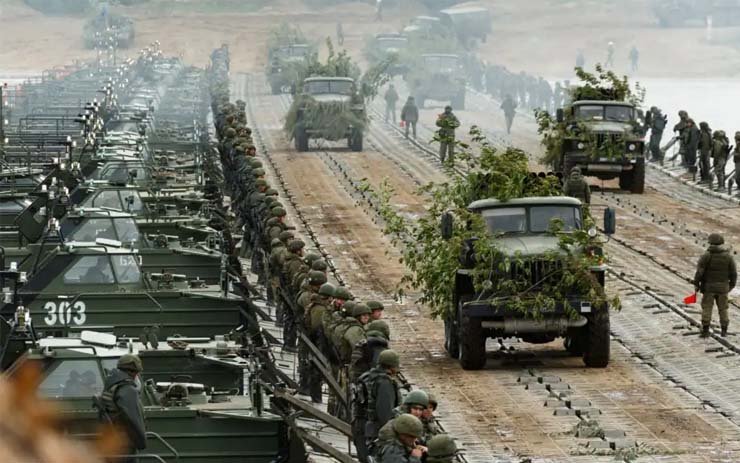
The forthcoming six-month-long winter months could pause and slow the movements of the Russian and Ukraine Army– if not permanently stop the war that has killed thousands, displaced millions and destroyed entire cities. Every passing day will make it difficult for the tanks and artillery to move due to heavy snow and freezing weather.
In such a situation New Delhi could play the role of peacemaker. This brings up the question – does India have the necessary clout and stamina to take up the herculean task?
Military history is full of examples of seemingly endless wars coming to an end when one combatant decisively defeats the other, or both are too exhausted to carry on. In the ongoing war, both Russia and Ukraine have lost more than 100,000 troops each but are still not prepared to talk the language of peace and gracefully accept a ceasefire.
Hence the biggest task before a peacemaker is to provide a formula that is acceptable to both sides and make them agree to a ceasefire through diplomacy and persuasion. But the biggest problem is that both Russians and Ukrainians think they are winning and don’t want to talk to each other. Ukraine feels it has the upper edge in the battle and hence is in no mood to talk, Russia thinks so too.
This was the reason why the “peace treaty” being negotiated by Turkey to end the war between Moscow and Kyiv failed to take off. Similarly, the peace proposal mooted by Poland and Italy could not muster a consensus even within the European Union.
Russia and Ukraine held several rounds of talks to halt the war and come up with a cease-fire agreement in which several proposals were discussed including a commitment by Ukraine that it would not join NATO. There were also suggestions that Ukraine should formally give up Crimea and Donbas if Russia withdrew to the pre-war borders.
In such a scenario, India which is a friend of both East and the West has the ability to act as a mediator and end the conflict but much depends on whether Ukraine and Russia have softened up enough to talk the language of peace and disengagement. Another possibility that cannot be ruled out is a joint mediation effort by India, Israel, and U.A.E. All three of them collectively have the weight to make Russia and Ukraine talk the language of peace provided it fits their mood and timetable.
Setting the pace, Indian Prime Minister Modi told Putin that “today’s era is not an era of war”. According to a statement issued by the Prime Minister’s Office (PMO) Modi even called up Ukrainian President Volodymyr Zelensky and made it clear that there could be “no military solution” to the problem and offered to act as a mediator for early cessation of hostilities. But Zelensky reportedly turned down the offer and while addressing the UN General Assembly on September 21 insisted that Russia must be punished for its “illegal war” against Ukraine. The non-negotiable “peace formula” according to Zelensky should include setting up a tribunal to punish Russia for the war crimes, and restoration of Ukrainian territorial integrity. Zelenskyy has made it clear that Ukraine will enter into serious peace negotiations with Russia only after its troops pull out or retreat from all of the territory occupied by them after February 24.
According to analysts both Russia and Ukraine are currently the biggest hurdle for the peace talks to happen. “A crime has been committed against Ukraine, and we demand just punishment,” Zelensky told the United Nations General Assembly in a pre-recorded message to the world leaders.
“The crime was committed against our State borders. The crime was committed against the lives of our people. The crime was committed against the dignity of our women and men. The crime was committed against the values that make you and me a community of the United Nations,” he added.
But what Zelensky is not prepared to accept is that the longer the war goes on, the more opportunity Russia will have to cement its hold on the territory Ukraine has lost and cover up its war crimes there.
India as a Mediator: The Need for a Proactive Approach
Ukrainian envoy to India Igor Polikha urged Prime Minister Modi to play an active role in controlling the situation. “I don’t know how many world leaders Putin may listen to but, the status of Modi ji makes me hopeful. Because of his strong voice, Putin would at least think it over. We are expecting a much more favourable attitude from the Indian Government,” he said.
“We are asking, pleading the support of India… India should fully assume its global role. Modiji is one of the most powerful and respected leaders in the world,” Polikha said.
Even Russian Foreign Minister Sergey Lavrov seemed favourably inclined to accept India as a mediator in the Ukraine conflict as an independent nation that is “not under the influence of the US”.
Likewise in an article published in Strait Times, former Singaporean diplomat Kishore Mahbubani who served as President of the United Nations Security Council made it clear that India is best suited to mediate the dispute between Ukraine and Russia because of the goodwill it enjoys both in Washington and Moscow. “Delhi should seize the opportunity to bring an end to the conflict, a move which would burnish its credentials for a permanent place in the UN Security Council”, he wrote in the article.
External Affairs Minister S Jaishankar informed the Lok Sabha that India will be “glad” to help in resolving the Ukraine crisis. “We believe no solution can be arrived at by shedding blood and at the cost of innocent lives. In this day and age, dialogue and diplomacy are the right answers to any dispute and this should be borne in mind. If India has chosen a side — it is the side of peace and it is for an immediate end to violence. This is our principled stand and it has consistently guided our position in international forums and debates, including in the United Nations,” he asserted.

The question before the Indian Foreign policy planners and strategists, therefore, is not whether to negotiate or not, but when to do so and how. The idea of third-party mediation is not new to India which is a credible ‘mediator’ and opinion leader to push the peace process forward.
As Nehru said in 1946, “India, constituted as she is, cannot play a secondary part in the world. She will either count for a great deal or not count at all.”
Significantly India played a part in ending the war in the Korean peninsula in 1953 by engaging all the major stakeholders – the US, USSR and China. India acted as a mediator in the three-year-old War between North and South Korea which came to an end at 10 am July 27, 1953. It was the longest negotiated armistice in history and involved 158 meetings spread over two years and 17 days. The agreement helped establish a Neutral Nations Repatriation Commission, chaired by India, to determine the fate of more than 20,000 prisoners of war from both sides. The successful end of the conflict which claimed the lives of millions of soldiers and civilians elevated India’s stature as a diplomatic negotiator among the newly independent Afro-Asian countries.
The mid-50s saw India as Chairman of the International Commission for Supervision and Control (ICSC) to facilitate the peace process in Vietnam after the Geneva Conference on July 21, 1954, recognized the 17th parallel north as a “provisional military demarcation line” dividing the country into two zones, communist North Vietnam and pro-Western South Vietnam. India later established full diplomatic relations with unified Vietnam on January 7, 1972.
India has always played a lead role in preserving world peace and security. The history of India’s UN peacekeeping dates back to the 1950s. Since then India has contributed more than 195,000 troops – the largest number from any country and participated in more than 49 missions. More than 168 Indian peacekeepers have sacrificed their lives while serving in UN missions.
One of the key objectives of Indian foreign policy has been to maintain cordial relationships with all sides in a dispute, steering clear of regional geopolitical complications and sensitive political issues. It takes no stance on international conflicts in faraway lands and refuses to offer solutions, or support one side or another in a dispute.
In 2019 US President Donald Trump dropped a bombshell when he claimed that Prime Minister Narendra Modi had sought mediation in Kashmir when they met during the G-20 summit in Osaka. This was categorically rebuffed by External Affairs Minister S. Jaishankar who informed the parliament that PM Modi did not ask Trump to “mediate or arbitrate” on the Kashmir issue. India remains committed to discussing all issues with Pakistan bilaterally he said.
India’s stand is clear. It does not want third-party mediation on Kashmir and hence does not go about offering solutions for conflicts in other regions. This is one of the reasons why India has voluntarily stayed away from the Middle East Peace Process despite being called upon by leaders from Palestine, Syria, and Israel to do so at different points in time.
India – Russia: present, past and future
The war against Ukraine has had a profound effect on the relations between Russia and India. This relationship is poised to undergo an even greater transformation due to the following reasons:
- Russia’s tilt towards China
- Russia’s diminished importance in Indian foreign policy perspective
- India’s growing relations with the United States
Just as India can’t afford to lose Russia, the US can’t afford to lose India. Both USA and India need each other.
In the early post-colonial years the Soviet view of newly independent India was not so charitable. Marxist Soviet leaders in Moscow used to tell the pro-Soviet Communist Party of India to pursue the path of revolution against the country’s “bourgeois nationalist” governments. However, things began to change after Stalin’s death in 1953 as well as Communist Party general secretary Nikita Khrushchev and Prime Minister Nikolai Bulganin’s visit to India in November 1955. They were the first Soviet leaders to visit India. This led to a close bond of friendship between Khrushchev and Nehru and the re-configuration of international politics. Soon the Soviet Union became India’s prime arms supplier and remained so until its collapse in 1991. The Soviet Union supported India in the 1971 war with Pakistan. Many Indian military officers received training in the Soviet Union.

Today nearly 97 per cent of India’s main battle tanks, 100 per cent of its armoured fighting vehicles, 67 per cent of its submarines, 68 per cent of the anti-ship cruise missiles aboard its guided-missile destroyers and frigates, and 97 per cent of its fighter aircraft have been imported from Russia. Even India’s BRAHMOS cruise missile was co-developed with Russia. Despite this, Russian-Indian relations are undergoing a major change. India has for some time been slowly decoupling from Russia and strengthening its relations with the West, especially the US.
There was a time when the Soviet Union helped India in the UN Security Council by exercising its veto powers in 1957 and 1962, but a lot has changed since then. Even though Moscow is still India’s most prominent defence supplier, imports from Russia have plummeted by almost 50% from 2017 to 2021. India’s desire to develop its own defence industry has resulted in declining Russian arms deliveries to India in recent years.
According to analysts former Russian Prime Minister, Yevgeny Primakov proposed a Russia-India-China strategic partnership in 1998, but it was rejected both by India and China even at the time and did not materialise into real diplomatic practice during his tenure in office or anytime thereafter. However, this is not the first time India has refused to be part of the global campaign against Moscow. Even the previous governments in New Delhi opposed a U.N. resolution condemning the Soviet Union’s invasion of Afghanistan in 1980 and again abstained from condemning Russia’s annexation of Crimea in 2014.
Calling for an “immediate cessation of hostilities”, India’s permanent representative to the UN Ambassador Ruchira Kamboj made it clear that dialogue is “the only way to settle disputes”, and regretted that diplomacy had been “abandoned”.
As External Affairs Minister S Jaishankar spelt out while addressing the 77th UN General Assembly, “We are often asked whose side we are on. And our answer, each time, is straight and honest. India is on the side of peace and will remain firmly there.”
-The writer is a seasoned media professional with over three decades of experience in print, electronic, and web media. He is presently Editor of Taazakhabar News








